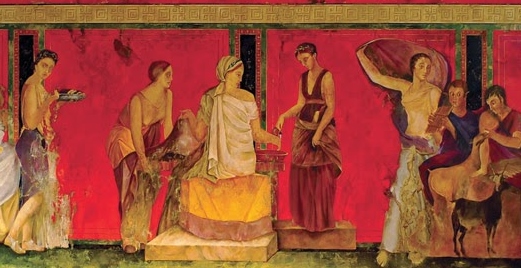 |
| Pompeii mural, Villa of Mysteries |
In this Roman comedy, identical twins are engulfed in confusion, forming the basis for William Shakespeare's The Comedy of Errors (circa 1595, first published in 1623).
To make a long story short, in the set-up for Menaechmi, two identical twins are accidentally separated at age seven, and their father dies within days of this mishap. A grandfather renames the boy he can find the same name as the still missing (and presumed dead) boy, as an honor. Years later, the former, after traveling far and wide and always hoping to find his long lost twin brother, stumbles into said twin's town and a delicate situation involving Matrona (twin's wife) and Erotium (twin's paramour), exacerbated by various in-betweens.
In the case of Plautus, adapting from a similar Greek play, his tale of identical twins works. The basic groundwork is laid for all sorts of similar -- and similarly ludicrous, comic, or horror-filled -- storylines.
Thinking you know someone and discovering an alien presence can be quite disconcerting. Hence, the ever-enduring fear and dread of zombies, vampires, alien or demonic possessions, clones and reprogrammed memories, pretender-imposters and dementia.
Such Doppelgänger-type stories that have always impressed me include Nikolai Gogol's Нос / "The Nose" (1836) and Fyodor Dostoyevsky's Двойник / The Double (1846, 1866). All inspiration for The Twilight Zone, no doubt.
Identical twins as a device have been exploited in many soap operas, a fine example being Stuart and Adam Chandler (David Canary) on All My Children. Great way to squeeze new arcs out of the same actors. The phantom twin can be haunting and unsettling, too: such as Elvis Aaron Presley's twin brother Jesse Garon, who was stillborn.
Today's Rune: Protection.

























































